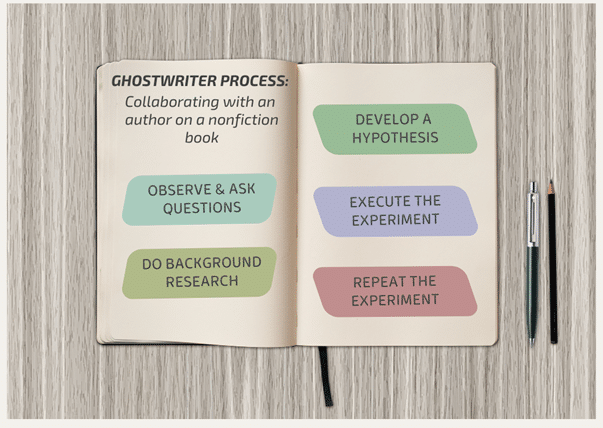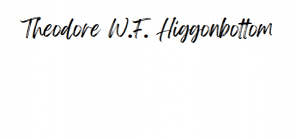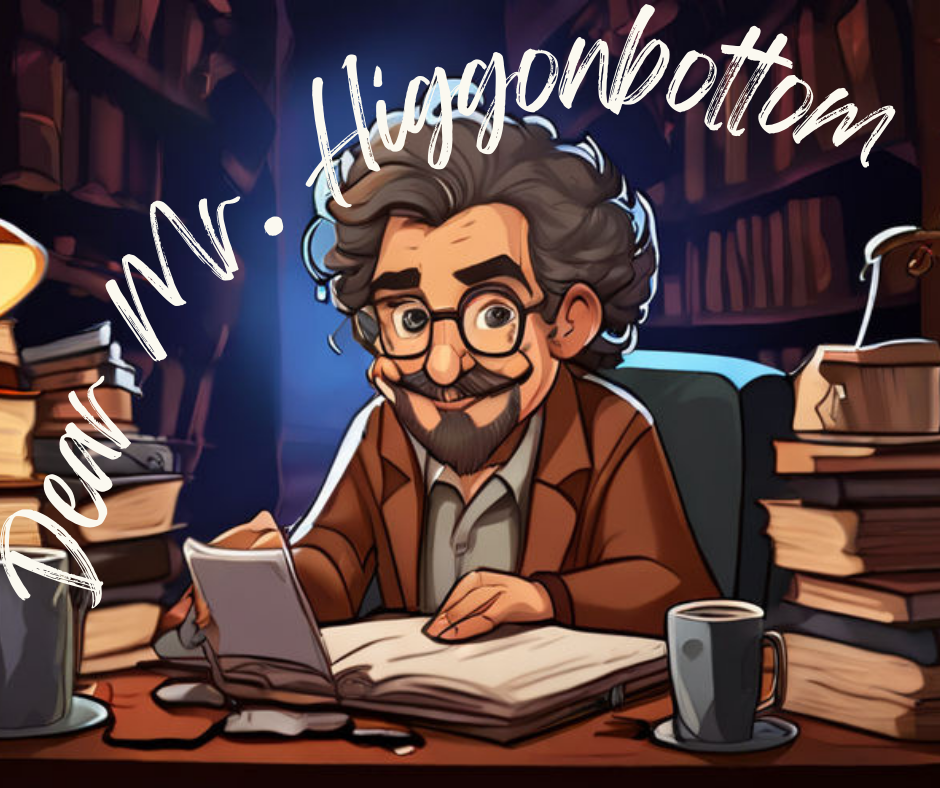How Do Ghostwriters Work With Authors on Nonfiction Books?
February 4, 2025
Dear Mr. Higgonbottom,
What is your writing process like when collaborating with an author on a nonfiction book?
Dear Curious Collaborator,
Boo! Just kidding.
Although ghostwriting might sound spooky, my process for working with an author on a nonfiction book is anything but! In fact, teaming up with an author to help ghostwrite their nonfiction book is kind of like being a literary scientist executing the scientific method: It involves a methodical approach that’s both thorough and closely pertains to the background information source. But don’t worry, you won’t need a lab coat to use my process—check it out!

OBSERVE AND ASK QUESTIONS.
My process starts at the very beginning: Understanding the author’s goals. This is when I meet with the author and take as much time as we need to discuss everything—and I mean everything. For instance, this is when I ask questions like:
- What do you want the central message of the book to be?
- Who’s the intended audience?
- What kind of background knowledge is your audience likely to already have?
- What sort of tone do you want to apply?
- What are your ideas for the title of the book?
- How do you want readers to feel after closing the book?
- What do you want readers to do after closing the book?
- What concerns do you have with the book?
Want a bonus tip? This is also a great time to ask the author about their own writing process. Knowing their process will help you understand the author’s expectations and how you fit into the project, identify any potential gaps or shortcomings, and how you can generally help strengthen the collaboration.
DO BACKGROUND RESEARCH.
The next step involves preparation. This is absolutely critical, as nonfiction demands accuracy. And you know what accuracy means: Research, Research, Research. Depending on the author’s topic, your research efforts might entail hitting the local library, traveling to the Library of Congress, digging into materials provided by the author, diving into online repositories, interviewing subject matter experts (or SMEs), experimenting with different tools… You get the idea. The point is, this is when you put the work in to make sure the foundation of the book is rock solid.
Want a bonus tip? This is a great time to ask the author for any and all examples of their existing writing. Remember, as a ghostwriter, research isn’t just limited to the book’s topic, it also extends to the book’s voice. (Take a look at my ghostwriter tips for maintaining the author’s voice and style for more help!)
DEVELOP A HYPOTHESIS.
After you’ve done your research, it’s time to flesh out the big picture. This is when I draft a detailed outline for the book, broken down into chapters and key topic points.
Want a bonus tip? Since this outline will serve as the book’s roadmap, the author needs to be in agreement with every single element. To save yourself time from any potential rework, I strongly recommend that you frequently share your outline with the author and request their input and feedback. Talk about setting yourself up for success!
EXECUTE THE EXPERIMENT.
Once the book’s structure is established in an outline the author approves of, it’s time to begin writing. But remember, it’s not just writing—it’s writing in the author’s voice. This is when all those early conversations with the author come in handy and really shine. It might seem daunting to try and emulate a voice other than your own, but you can do it! Do your best to capture the author’s personality, quirks, and expertise so the book feels authentically theirs.
Want a bonus tip? Just as you did when drafting the outline, it’s important to frequently send chunks of your work to the author for review and feedback. This is especially crucial when you’re first getting started and grounding yourself in the author’s voice.
REPEAT THE EXPERIMENT.
You know what they say: Writing is rewriting. In other words, this step is essentially on repeat until the book is finished. So, as you progress through the book, make sure you’re regularly sending sections of the book to the author for their review. It’s important they feel the book represents them fully—after all, it’s their name on the cover!
Want a bonus tip? Even though you might be excited to keep going, waiting for the author’s feedback before proceeding with additional sections will save you a lot of time in the long run. Trust me, it’s best practice to actively incorporate the author’s feedback as you work, even if you have to wait a bit to receive the author’s input.
Ghostly Yours,
































